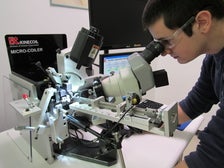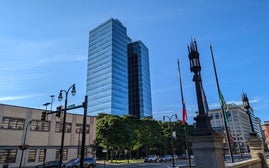Biz group: renewable energy not keeping up with demand
Another business group has joined those already clamoring to let more natural gas into the region, and indirectly clashing with renewable energy proponents who have become an aggressive lobbying force on Beacon Hill.
In a March 12 letter to Gov. Charlie Baker and legislative leaders released on Tuesday, the Massachusetts Competitive Partnership said renewables are not coming online fast enough to keep up with demand for energy and the planned retirements of coal, oil and nuclear power sources. And they warned residents and businesses remain vulnerable to increases in carbon pollution and natural gas prices during high-demand periods because of pipeline constraints.
"While the region's energy mix is in transition, Massachusetts is at a severe competitive disadvantage. Massachusetts must address the region's constrained natural gas capacity to ensure energy reliability and price stabilization," partnership executives Dan O'Connell and Bryan Jamele wrote.
O'Connell served as housing and economic development chief under former Gov. Deval Patrick and the partnership's board features top executives from some of the state's largest companies and biggest energy users, including Partners HealthCare CEO David Torchiana, Kraft Group CEO Robert Kraft, Raytheon CEO Thomas Kennedy, Vertex Pharmaceuticals CEO Jeffrey Leiden, and Suffolk Construction CEO John Fish. Eversource Energy CEO James Judge also serves on the board.
The partnership's letter does not specify any remedies and a spokesman said the partnership is "open to any form of solution" but wants for now to emphasize to policymakers that the region's grid operator has warned about constraints on the region's energy supplies.
Citing statistics from ISO New England, the executives said that renewables and hydro power in 2017 accounted for 11 percent and 8 percent, respectively, of the region’s electricity generation, with natural gas at 48 percent but currently unable to sufficiently tap into lower cost sources in the Marcellus Shale.
The price of electricity in the Boston area has been 29 percent or more above the national average in February for each of the last five years, the federal Bureau of Labor Statistics reported last week, and the price of natural gas locally has exceeded that for the nation in February by 26 percent or more.
Oil, coal, and nuclear power sources equaling 16 percent of the region's current generating capacity are retiring between 2013 and 2021, the officials said.
Massachusetts is in the midst of two major procurements designed to boost long-term renewable energy supplies, including hydro and offshore wind energy.
Climate change activists in recent years have dogged projects intended to boost natural gas capacity in Massachusetts and elsewhere, while pressuring public officials to adopt policies speeding the transition to renewable energy. Few elected officials have sided publicly with the natural gas industry.
On Monday, at an event timed for the beginning of Holy Week and shortly before Passover, more than 50 religious leaders representing at least 15 different faith traditions plan to "confront Governor Charlie Baker around his refusal to meet with them regarding their concerns about climate change."
Tying carbon pollution and climate change to the recent damaging nor'easters, the faith leaders plan to host a ceremony on the steps of the State House, and then head inside the building "to renew their request for dialogue and to ask him to end his support for new dangerous fossil fuel projects."
The advocacy group Environment Massachusetts reported last week that more than 100 global companies have committed to a 100 percent renewable energy goal through the RE100 initiative, including companies with a presence in Massachusetts like Biogen, Facebook, Google, Microsoft, and P&G. Akamai Technologies of Cambridge has a 50 percent renewable energy goal and its chief security officer Andy Ellis says "it's what our customers and investors value."
Boston University and Harvard University have committed to the 100 percent renewable goal, according to Environment Massachusetts, while seven cities and towns have embraced the target and 56 legislators so far have signed on as cosponsors of a bill locking the state into a path toward 100 percent renewables.
"Massachusetts has the technical, financial and regulatory brains, as well as the private capital and innovation economy, to lead the world to 100 percent healthy and renewable energy," Jim Boyle, CEO of Sustainability Roundtable Inc. and member of the Alliance for Business Leadership, said in a statement.
The drumbeat for more renewable energy was interrupted in February when state trade and business groups launched the Mass Coalition for Sustainable Energy, telling state leaders they believe the state is risking its economic viability and needs to take more seriously the responsibility of ensuring that power generation sources are ready to deliver and affordable. The groups, including the Greater Boston Chamber of Commerce, Mass. Business Roundtable, and Associated Industries of Massachusetts, also delivered letters to Gov. Baker and legislative leaders in which they cited regional grid operator ISO New England's recent warning that the state could be vulnerable to rolling blackouts and controlled power outages.
Some lawmakers and activists are pressing for new climate change and energy policies to be adopted before formal legislative sessions end for the year on July 31 but there presently does not appear to be lots of common ground on a path forward between House and Senate leaders and Gov. Baker.












0 Comments